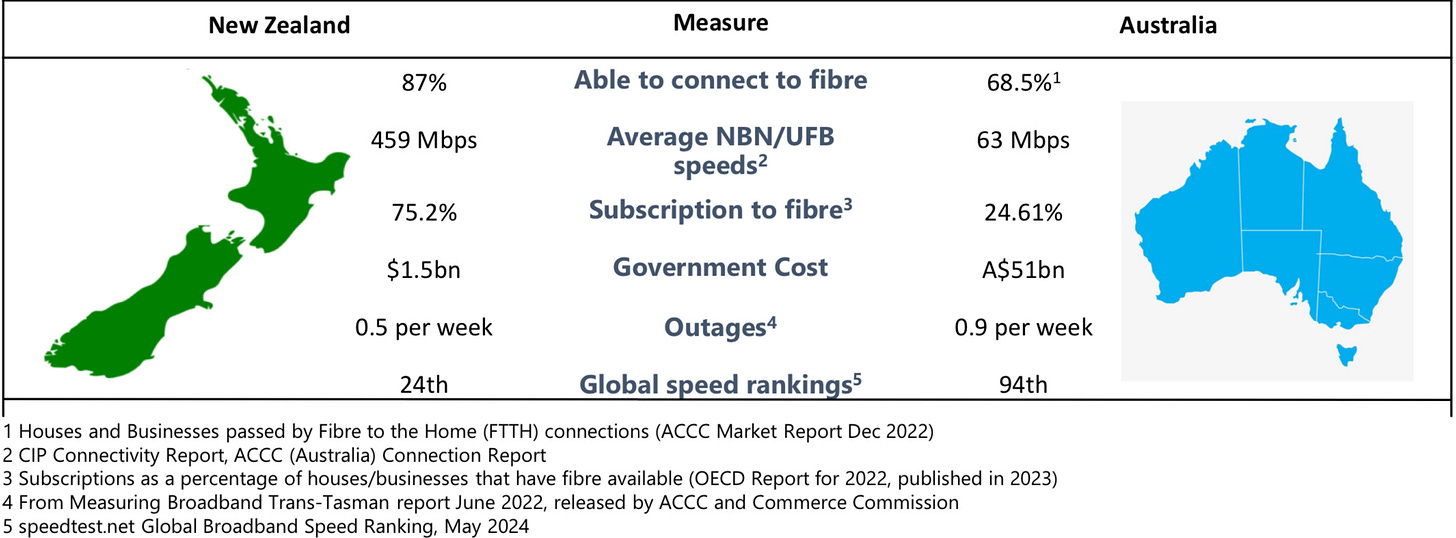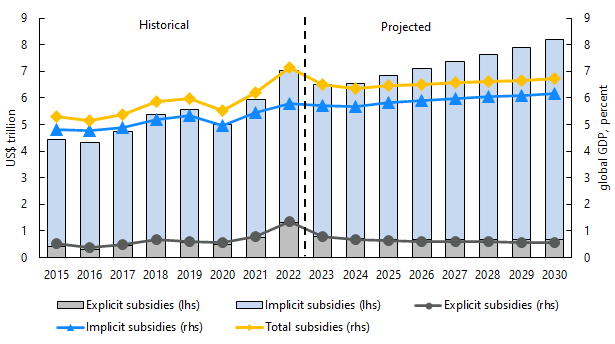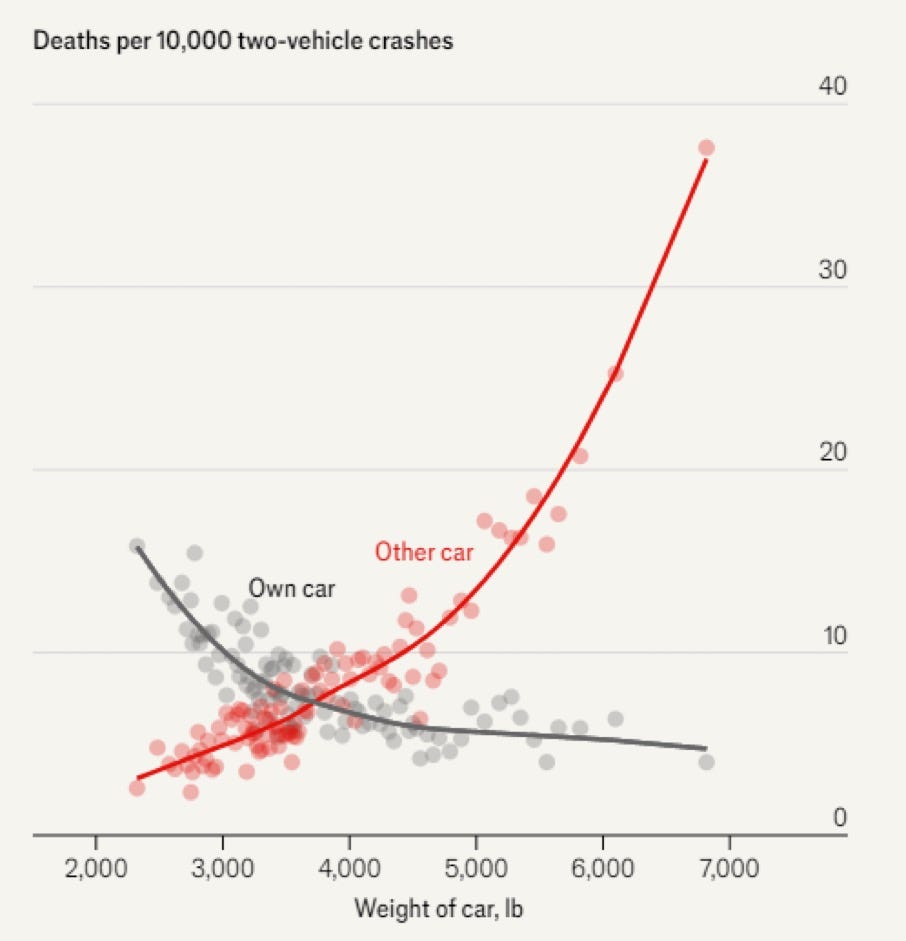
Mōrena. Long stories short; here’s my top six things to note in Aotearoa’s political economy around housing, climate and poverty on Monday, September 9:
Chris Hipkins widens Labour’s tax debate to include the 30% limit on the size of Government.
Chris Bishop wants plenty of bipartisan infrastructure investment, but remains a small Government and pro-markets guy, which makes that hard.
In solutions, National’s $1.8 billion investment of borrowed Government money to kick-start the Ultra Fast Broadband network in 2010 has been a model of public investment in a network infrastructure that benefited individuals, households, businesses and the Government alike. So why not do much more?
In Quote of the Day, John Tookey points out that Chris Bishop’s infrastructure ambitions are simply not possible if relying on private investment.
Our Chart of the day, the increasing weight and size of vehicles is killing more of the drivers in the cars they crash into.
Our Climate graphic of the day, global Government subsidies for fossil fuel extraction rose last year to a record-high US$7 trillion in 2022, the IMF reports.
(There is more detail, analysis and links to documents below the paywall fold and in the podcast above for paying subscribers.)
The Top Six on Monday, September 9
1. ‘An ageing population makes the 30% rule untenable’
Hipkins says Government will have to do more due to costs of ageing
Labour Leader Chris Hipkins has widened the party’s debate about Government debt and capital and wealth taxes to the size of Government, challenging Labour’s long-held view that it should not go over 30% of GDP.
Hipkins made the comments in this interview below with Q+A’s Jack Tame aired yesterday, in which he said:
“The big question mark is what happens with the working-age population. If the working age population stays the same, and the population over the age of 65 grows, then yes we will [have to increase the percentage of tax revenue compared to GDP]”
“We have to be honest about that. Let’s go back 10 years, there are now 200,000 extra people over the age of 65. There’s another 400,000 that’ll be there in the next ten years. That means our population over the age of 65 will have gone from 14% to 21%.”
“You can’t say to people over the age of 65 that we can give them everything that we gave them when they were 14% of the population and not increase government spending – the maths just doesn’t add up.” Chris Hipkins on Q+A
2. ‘Infra Boy’ has ambitions, but has shackled himself
Bishop wants big, bipartisan moves, but remains reliant on private funds
Simon Wilson published a very good deep-dive article in The NZ Herald-$$$ on Saturday that included an interview with Infrastructure and Housing Minister Chris Bishop, which illustrated Bishop’s fundamental problem.
Bishop is ambitious for big public infrastructure investment plans that are bipartisan and stretch over decades, but remains committed to making it privately funded, which the experts say (see quote of the day) say is just not possible.
Political parties push big decisions into the next decade or the one after, or else they announce grand schemes, often without funding attached. Those projects that do reach the planning stage take too long to develop and cost much more than expected, and political opponents cancel them the first chance they get. “It’s a collective problem,” said Bishop.
“It’s both National and Labour governments in the past 30-40 years. We just need to be honest about that and face the reality, which is that there’s a $100 billion deficit.”
And that was the big question the Infra Boys asked in Australia. How did they do it?
In Sydney, the key was Infrastructure NSW, an independent agency set up in 2012 to advise the state government. In its first year, with cross-party support, it delivered a 20-year State Infrastructure Strategy.
Bishop wants to do the same here. He’s asked for a 30-year strategy from Te Waihanga, the Infrastructure Commission, which is an autonomous Crown entity set up by the Ardern Government in 2019.
And he will have a new National Infrastructure Agency (NIA) in place by December, established with $5 million in funding in this year’s Budget.
The NIA, independent and run by experts, will act as a “shopfront” for unsolicited proposals, organise private-sector investment, administer Crown funds and provide commercial advice. NZ Herald-$$$’s Simon Wilson
The trouble is Bishop is already kneecapped by his Government’s insistence on not borrowing more in its own right, as Infrastructure Under-Secretary Simon Court pointed out in his speech to the same Building Nations conference Bishop spoke to.
“This work accepts the reality that tapping into private capital, capacity, and capability is a necessity and not a choice, especially given the dire state of the government books we inherited.” Simon Court in his speech to Building Nations
3. Solutions: National did it before with UFB. Why not again?
The John-Key-led National Government of 2008-2017 borrowed $1.8 billion in total to invest in a rollout of Ultra-Fast Broadband (UFB) fibre to cities and towns up and down the motu.
It means 87% of New Zealanders in 412 cities and towns now have access to UFB fibre and over 1.8 million homes and businesses across Aotearoa are able to connect to the UFB network, MBIE reports.

4. Quote of the day
The most awful feedback loop in our health system
“The amount of public infrastructure that’s required maxes out the ability of private finance to be able to fund it.” Professor John Tookey from the School of Future Environments at AUT speaking to Simon Wilson in his excellent deep-dive on infrastructure funding in Saturday’s NZ Herald-$$$
5. Chart of the day
The heavier a vehicle gets, the deadlier it is for the other driver
6. Climate graphic on global fossil fuel subsidies
Just imagine what could be done if this money was spent on renewables

The best of the rest on Monday, September 9
Top six scoops
Poverty scoop: Shock closure for family centre after funding pulled RNZ’s Ruth Hill
Politics scoop ACT pledges pushback on supermarket crackdown RNZ’s Craig McCullough
Politics scoop:Documents obtained by 1News show Minister Nicole McKee, a former gun lobbyist, has used a backroom process to change New Zealand law in a way that benefits gun clubs. 1News’ Thomas Mead
Transport scoop: Promise to begin new tunnel this term in doubt NZ Herald’s Thomas Coughlan
Politics scoop: Since being sworn in as prime minister on November 27 last year, Christopher Luxon has notched up nine overseas tripsThe Post-$$$’s Kim Griggs
Infrastructure scoop: No funding for bridge could spell the end for the Melling line. Hutt City Mayor is going to fight for a bridge, which is a key component of Riverlink. Greater Wellington says that without the bridge, the Melling line could close. The Post-$$$’s Nicholas Boyack
Top six deep dives
Economics deep dive: How a mind boggling device changed history FT (free link)’s Tim Harford
Inequality deep dive: Celebrity breakfasts, gala dinners, champagne evenings. This is how 12 schools raised more than $100m between them in a decade. The Press-$$$’s Brett Kerr-Laurie
Transport deep dive: 'Our children are not skittles': Community rallies for safer crossings. Community leaders are urging Auckland Transport to rethink its approach to the safety upgrade of a busy roundabout that's seen 50 crashes in five years. 1News LDR’s Mary Afamata
Transport deep dive: 'Risky, expensive and confusing' – councils challenge government's proposed speed limit changes 1News’ Mava Moayyed
Housing deep-dive: ‘Legal nightmare’: Auckland faces ‘avalanche’ of cross-lease disputesUnfit rules set down decades ago are now resulting in scores of bitter ‘neighbours at war’ conflicts, legal experts say. The Sunday Star Times-$$$’s Jonathan Killick
Climate deep dive: Air NZ, Mitre 10 get lowest scores in climate rankings RNZ’s Eloise Gibson
Top six interviews, columns and op-eds
Interview: New Zealand's ongoing housing crisis is fuelling high rates of rheumatic fever among Māori and Pacific peoples, says epidemiologist Dr Jason Gurney Q+A’s Jack Tame
Interview Mike Joy on his memoir and butting heads with Sir John Key RNZ Susie Ferguson
Column by Janine Starks in The Press-$$$ Time for Commerce Minister to cut through bank slipperiness on fraud. Andrew Bayly needs to follow through on his call for stronger anti-fraud measures by the banks.
Column by Vernon Small in The Sunday Star Times Hipkins gingerly moves on tax, but is it too little, too late?
Op-Ed by Opes Partners’ Andrew Nicol in Stuff: What’s the ‘magic’ number of properties I need to buy? Somewhere between three to five for most well-off kiwis?
Column by Andrea Vance in the Sunday Star Times-$$$ Labour and the capital gains tax doom loop
The Kākā’s Journal of Record for Monday, September 9
Poverty: The Public Health Communication Centre warned that NZ dementia cases are expected to double over the next 20 years, with 45% of cases resulting from preventable risk factors linked to poverty. Māori and Pacific people face higher rates of dementia risk factors, including smoking, obesity, high blood pressure, and lack of exercise. NZ Herald
Economy: Associate Minister of Finance David Seymour announced the Government would rewrite the Overseas Investment Act to encourage direct foreign investment in NZ. He added that there had been roughly as many foreign direct investment applications in the last two months as in the six months prior.
Economy: Stats NZ reported that the value of residential building work, including material and labour costs, was down 4.1% in June 2024 compared with June 2023, whereas the value of non-residential building work went up 7.8%. Construction costs increased by roughly 3% in the 12 months to June 2024.
Climate: The University of Otago’s Climate Research Network launched a website which evaluates the emissions reduction activities of NZ companies using publicly available reports and their mandatory climate-related disclosure data. The evaluations focus on progress towards 2030 and 2050 net zero targets. RNZ
Justice: Erica Stanford announced that Oranga Tamariki's Crown Response Unit, established in 2019 to co-ordinate responses to the Royal Commission into Abuse in Care, would be expanded and moved to the Public Service Commission. The new Crown Response Office would continue to plan and monitor the Government & public service's progress on the Royal Commission's recommendations.
Te Ao Māori: The New Zealand Medical Journal published an article on the potential for Māori organisations to operate hospitals, in light of evidence showing that Māori present with more serious symptoms at hospital, more often receive sub-optimal, and discharge themselves early more often. The authors discussed successful examples of Indigenous-run hospitals in the USA and Canada.
Finally, some fun things
Cartoon of the day
‘Don’t mention the ferries’
Timeline-cleansing nature pic
A Kākā with regrets

Ka kite ano
Bernard
PS: PSA. Don’t drink and fly.












Share this post